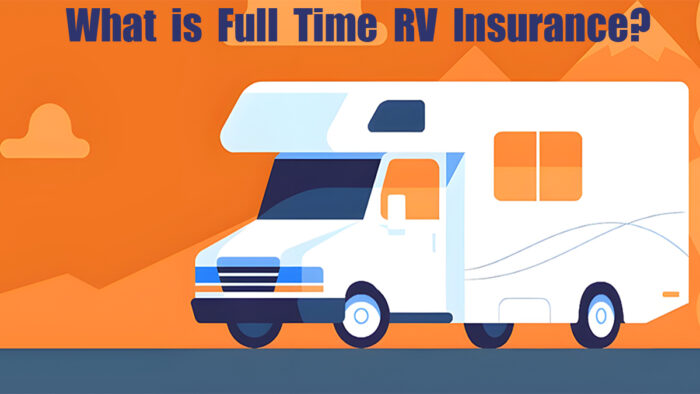Full-time RV insurance is designed for those who live in their RV for more than half of the year, whether it’s a motorhome or travel trailer. It offers a range of optional coverages that provide protection for those who reside in their RV permanently.

With full-time RV insurance, you can enjoy peace of mind knowing that you’re covered against various liabilities, injuries, and losses that may occur in and around your RV.
This insurance is essential for those who rely on their RV as their primary residence and want to ensure they are protected against unforeseen circumstances. By investing in full-time recreational vehicle insurance, you can have confidence that you’re covered no matter where your recreational vehicle takes you.
What Distinguishes Part-Time and Full-Time RV Insurance Policies?
Part-time RV insurance policies typically offer vacation liability coverage, which covers injuries or damages that occur in or around the RV during brief trips. In contrast, full-time recreational vehicle insurance provides broader coverage for a longer period, including personal liability, medical payments, loss assessment, comprehensive and collision coverage, and vacation liability.
Full-time RV insurance is similar to home insurance, covering personal liability, injuries, property damage, and other losses that may occur while the RV is parked. It is designed for those who use their RV as a primary residence or live in it full-time.
This insurance covers unique risks associated with living in an RV full-time, such as temporary accommodations if the RV is damaged and unlivable, medical and legal fees if a guest is injured, and HOA fees for repairs in RV parks.
On the other hand, part-time RV insurance covers the RV inside and out while on the road or parked at a campsite, including general liability protection, physical damage coverage, and personal effects coverage.
Full-time RVs require insurance coverage that resembles their homeowner’s insurance policy, often with higher limits and additional coverage options such as towing/roadside assistance, uninsured/underinsured property and injury coverage, and emergency expense coverage.
What Makes Full-Time Recreational Vehicle Insurance Essential?
Living in an RV full-time exposes you to specific risks that part-time RVs do not encounter. In the event of damage rendering your motorhome uninhabitable, you may require temporary accommodations until repairs or replacements are completed.
Should a guest sustain an injury in your RV and pursue legal action, you could be liable for medical expenses and legal fees. Moreover, residing in an RV park introduces additional considerations, like HOA fees for repairs.
Full-time recreational vehicle insurance provides coverage for these distinct risks and more, ensuring comprehensive protection for individuals who make their recreational vehicle their permanent residence.
By securing full-time RV insurance, you can rest assured that you are safeguarded against a range of potential liabilities, injuries, and losses that may arise in or around your RV, regardless of your location.
What is the Cost of Full-Time RV Insurance?
The cost of full-time recreational vehicle insurance is influenced by the level and extent of coverage selected. Compared to recreational policies, full-time recreational vehicle insurance typically costs more due to the increased liability protection it offers.
However, the added expense is worthwhile if your RV serves as your sole or primary residence for six or more months of the year, a common requirement for qualification.
To maximize savings, it’s advisable to explore available RV insurance discounts. These discounts can help offset the cost of full-time RV insurance, making it more affordable for those who rely on their RV as a permanent or long-term residence.
By selecting the appropriate level and combination of coverage and taking advantage of available discounts, you can ensure that you have the necessary protection without exceeding your budget.
Is it Possible to List Your RV on Rental Platforms While Having Full-Time Coverage?
When considering renting out your motorhome or trailer on platforms such as Outdoorsy, numerous RV insurance providers may not offer coverage for this scenario. However, Roamly stands out as the sole online RV insurance provider that fully supports and covers such rental arrangements.
By choosing Roamly, you can avoid concerns about losing coverage or navigating complex insurance-related intricacies. Furthermore, when utilizing Outdoorsy’s supplementary rental-period insurance for verified vehicles, your RV remains protected throughout the rental period without any gaps in coverage.
This comprehensive approach ensures that both your RV and your rental activities are adequately covered, providing peace of mind for both owners and renters alike.
FAQs
Why is full-time RV insurance more expensive than part-time RV insurance?
Full-time RV insurance is more expensive than part-time RV insurance because full-time RVers spend more time in their RVs, increasing the likelihood of accidents or damage. Additionally, full-time recreational vehicle insurance offers more comprehensive coverage options tailored to the unique needs of full-time RVers, which contributes to the higher cost.
However, the added protection and peace of mind provided by full-time recreational vehicle insurance are well worth the investment for those who live in their RVs full-time.
Can I use my full-time recreational vehicle insurance for short-term trips?
Yes, full-time RV insurance can be used for short-term trips, as long as the policy includes coverage for temporary use outside of your primary residence. However, it’s important to review your policy and understand the specific coverage and limitations for short-term trips.
Can I customize my full-time RV insurance policy?
Yes, full-time recreational vehicle insurance policies can be customized to meet your specific needs and budget. You can choose the level of coverage, deductibles, and additional coverage options that best fit your situation.



